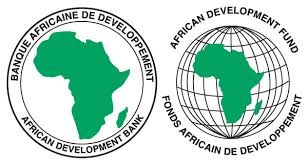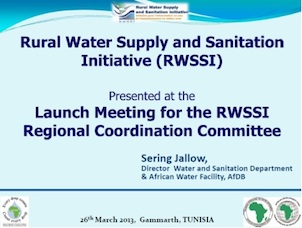Tunisian sector experts launch a new coordination mechanism for flagship Rural Water Supply and Sanitation Initiative.
Published on: 01/04/2013
Last week in Gammarth, Tunis the African Development Bank called a meeting, attended by about 160 sector experts and other government officials, to launch a new coordination mechanism for its flagship Rural Water Supply and Sanitation Initiative, or RWSSI. It was an interesting couple of days and through the various presentations, discussions, working groups and questions from the floor, a number of key opportunities and challenges – fault-lines even – were revealed to me, as a relatively neutral participant.

First a few words of background. The RWSSI was launched in 2003 as a common pan-African framework for resource mobilisation and investment in the rural sub-sector. Since its launch, the RWSSI has helped to contribute to increased access for significant numbers in this first eight years – 45 and 30 million respectively for water and sanitation; but treat these claims with a pinch of salt as they include all people with new first-time access, regardless of funding within the RWSSI framework or not. Following an in-depth mid-term review in 2010/11, five problem areas were identified, including: inadequate investments; limited coordination at national and sub-national levels; weak coordination at regional level; lack of a forum for exchange of lessons and issues; and poor knowledge management.
This meeting was then intended to address the issue of ‘regional’ coordination and in fact the invitation was to attend the launch of the ‘Regional Coordination Committee’ of the RWSSI.

What first struck me was the mix of participants. A strong showing from the Water and Sanitation Department of course. And for sure there was the usual set of rural WASH expert friends from Regional Member Countries (RMCs) and a very small number of representatives from non-RMCs (largely donor partner countries). But also a good smattering of Ministry of Finance (MoF) staff from various countries; I shared a taxi to the venue with someone from the Moroccan MoF who interestingly had no prior knowledge of the RWSSI, let alone the intricacies of the proposed new coordinating body.
The goodwill and enthusiasm expressed in such meetings inevitably fades into the background when people return to their ministry day jobs.
This was one of the first positive takeaways from my visit, in that one of the constant themes of the meeting – pressed home by both technical OWAS staff and others – is that it is primarily government spending and user tariffs that are going to bridge the financing gap. It was great to hear this positive message that African government’s can, and must, do more to invest both in capital infrastructure and most importantly to support long-term recurrent costs. It was also interesting to hear the declaration that there are now several African states, including Burkina Faso, Chad and Cote d’Ivoire actively funding the RWSSI.
The very fact of the meeting illustrated another positive story for me – the OWAS recognising that it needs to do more to socialise the findings of the mid-term evaluation and to bring people into the process before simply landing any new coordinating mechanism on them. In discussions over coffee and in the corridors it is apparent that, as with any other big, ambitious multi-country initiative, the goodwill and enthusiasm expressed in such meetings inevitably fades into the background when people return to their ministry day jobs. But by bringing this group together and listening to their concerns and priorities, the AfDB will have gone a long way towards building the foundations for better cooperation and buy in down the road.
During the meeting itself, there were quite a few questions and doubts expressed about the need for a new regional coordination committee and what the ‘region’ in its title actually refers to – Africa as a region? The five official sub-regions of the continent? The other big faultline is how this structure would relate to – or possibly even duplicate – existing structures and what its official mandate would be? One of the strongest and loudest voices on this issue was from AMCOW, in particular the need to avoid setting up any parallel or duplicate structures at a continental level. The (political) mandate of AMCOW and its primacy as the only legitimate sector body at regional, that is to say, pan-African, level was clearly delivered over and over again. At the same time, AMCOW also repeatedly underscored its commitment to the RWSSI.
One example was in the area of monitoring where I presented some findings around monitoring from our work in Triple-S as one of the four working groups and ended up facilitating on the second day of deliberations. The AMCOW executive secretary was very emphatic in stating that we should not reinvent the wheel when trying to come up with standardised definitions and indicators of access and service and that AMCOW already has a framework on M&E. When we pressed on this issue it became apparent that this framework is actually still under development.
In the end – and with the hand of AMCOW on the small of the back, I sensed – the Regional Coordination Committee title was hastily renamed the RWSSI Coordination Committee and launched at the end of the meeting. As a footnote to the proceedings, what did this tell me? That, just as with any complex initiative that has to link institutional levels and organisations with differing mandates, and which relies on active participation, there will always be gaps between expectation and reality. The attempts to make a fit between a continental initiative and national priorities reminded me of the same discussions in the post-JMP working groups – how can a global set of targets and indicators be relevant for such a range of national contexts?
In the end, it’s all about communication and dialogue. Without this, the OWAS will sit in Tunis unable to effectively work with RMC sectors on the critical challenges of the day. This meeting was another positive step in keeping these discussions going and working through the very real challenges as the delegates wend their way back to 54 African countries.
At IRC we have strong opinions and we value honest and frank discussion, so you won't be surprised to hear that not all the opinions on this site represent our official policy.